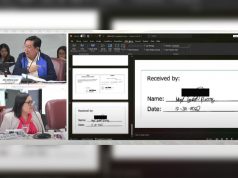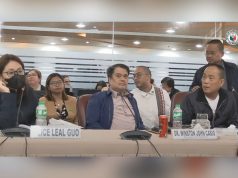MANILA, Philippines — The House of Representatives’ committee on public information has renewed efforts to pass the Freedom of Information bill, which has remained pending for funding at the committee on appropriations since February.
“As chairman of the committee on public information, I can only urge my colleagues who sit in the appropriations committee to expedite the FOI bill at the soonest … We have to institutionalize it across all government departments and agencies,” Bagong Henerasyon party-list Representative Bernadette Herrera-Dy said.
However, Herrera-Dy acknowledged that the measure can only be given attention in the last week of September, when the proposed 2018 national budget should have been approved on third and final reading.
Lawmakers have been deliberating the FOI bill for more than two decades now.
President Rodrigo Duterte, who has vowed to enact an FOI law, issued Executive Order No. 2 on July 23, 2016 ordering all agencies and offices in the executive branch to make information accessible to the public.
The FOI bill, on the other hand, mandates the disclosure of public documents, including the detailed Statement of Assets Liabilities and Net worth of public officials, Herrera-Dy said.
At the same time, Herrera-Dy said the consolidated bill provides that government may disallow disclosure of information in the following instances:
- If it could cause serious damage to national security and our country’s internal and/or external defense
- If it could unduly weaken our country’s bargaining position in international negotiations or seriously jeopardize diplomatic relations with other countries
- If it could compromise law enforcement operations and endanger the life of an individual
- If it is obtained by Congress in executive session
- If it is within the executive privilege
- If consists of drafts of the following: orders, resolutions, decisions, memos or audit reports by any executive, administrative, regulatory, constitutional, judicial or quasi-judicial body in exercise of their adjudicatory or audit function
- If it is a trade secret
- If the information requested would constitute an unwarranted invasion of an individual’s right to privacy
“It is emphasized that the said exceptions cannot be invoked to cover-up a crime, wrongdoing, graft, or corruption,” she said.
Under the bill, administrative and disciplinary sanctions will be imposed against any public official or employee who willfully and knowingly commits the following:
- Refusal to promptly forward the request
- Failure to act on the request within the periods required by this Act
- When the claim for refusal is manifestly devoid of factual or legal basis
- Refusal to comply with the decision of his immediate supervisor, the Ombudsman, or of any court ordering the release of information; and
- Approval of policies, rules and regulations contrary to the provisions of the Act
A public official or employee shall also be held liable for the crime of removal, concealment or destruction of documents as defined under Article 226 of the Revised Penal Code for the following acts:
- falsely denying or concealing the existence of information mandated for disclosure
- destroying, or causing to be destroyed, information and/or documents










